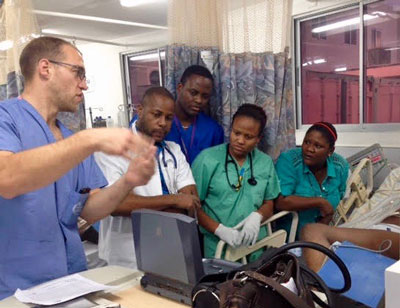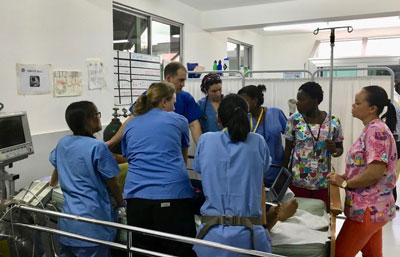Elective Time
Three months of dedicated elective time is available in the G2 and G3 years, and there is the availability of an additional 3 months across the 3 years. Residents' full salary and benefits continue regardless of where the elective time is spent. Since all 8 core subspecialties of Internal Medicine are standard in the residency schedule, residents usually use this elective time for a wide variety of activities including gaining additional experience in non-Internal Medicine areas, working in a foreign country, or pursuing a clinical research project.
Residents who are pursuing a possible subspecialty career have the option of expanding their elective time (1 additional block in the G1 year and 2 additional blocks in the G2 year) by replacing the two outpatient blocks and the neurology block with elective time. With counseling, residents use this time to pursue clinical research projects and additional clinical rotations in their selected field. These residents still receive all eight of the core subspecialty rotations plus the additional five elective blocks. See a list of previous electives below.
International Medicine
Knowledge about other cultures and diseases prevalent elsewhere in the world is an important part of internal medicine in our rapidly shrinking world. Our residents have worked in clinics in Peru, Ecuador, Africa, and Costa Rica, Thailand, Honduras, and many others (see the link below for others). We are full partners in the University of Minnesota's travel and tropical medicine pathway for residents. Through this association, residents may participate in the full global health curriculum, sit for the tropical medicine certificate, and arrange experiences in Bangalore, India, Chiang Mai, Thailand, or Lima, Peru. Financial assistance is available for selected rotations. Residents may also take as electives two one-month courses given at Regions Hospital in St. Paul, one of the few sites in the U.S. certified to fulfill the prerequisite for obtaining formal certification in this field.
Our residents have participated regularly in trips to Haiti where they teach ultrasound in combination with a large outreach effort involving multiple physicians from Abbott Northwestern hospital.
In addition, immigrant medicine is an important topic and experience at the ANW residents' continuity clinic, which provides care to many people recently arrived from East and West Africa, Tibet, Southeast Asia, and Latin America.



